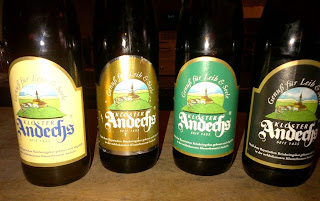 Non-Flash ENTIRE podcast (Part 1 and 2)
Non-Flash ENTIRE podcast (Part 1 and 2)The Jopen brewery in Haarlem, Netherlands began simply as one component of many festivities celebrating the 750th anniversary of the founding of the historic city of Haarlem, the namesake of another historic district, if not quite as established, in old New Amsterdam. Brewery manager Erwin and brewer Michel explained that, along with ideas of a jousting contest, culinary exhibitions, and other cultural events, a group of about 10 Haarlemers thought that brewing an old beer recipe was an excellent idea to honor the town.
 |
| Brewer Michel and B.R. |
 |
| Lydian and her husband Michel at Spuyten Duyvil. |
 |
| Michel and Andy of Spuyten Duyvil. |
The brewery has a wide range of ales in the portfolio, and continues to brew its original two beers. They try to work in some historic angle to all the beers that they produce. One thing that do is brew a lot of beers with oats, in addition to wheat malt and barley malt, which was a traditional Dutch brewing technique, giving the beer a nice, round, full body and mouthfeel.
 |
| Erwin at a foodtruck in East Williamsburg. |
 |
| The brewhouse in Haarlem. |
 |
| Glasses filled with Jopen collaboration Disco Bitch. |
 |
| Jopen Librije's Bier. |
























































